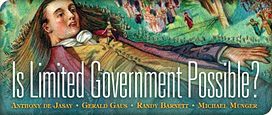I shall try to respond at great length soon. But I would like to make three brief points:
1. The title of the essay is not intended to be paradoxical, but is intended to make just the point that Anthony makes: No government can make a rock so big that it can’t lift it. As Jerry Ford once said, “A government big enough to give you everything you want is a govenrment big enough to take from you everything you have.” Anthony and I agree.
2. Nonetheless, governments have strong incentives to solve this problem. Anthony is entitled to his own view of French and English history, and I’m sure he is wrong about other things, too. Checks and balances are an important part of the American solution, at least. And Montesqueieu, rightly or wrongly, thought the English “Constitution” had by happy accident many of the same salubrious properties that are present in the American design by clear intention.
3. Most of all, I second his concluding thoughts. We do agree, and I think for the same reasons. He is correct in his analysis, I believe, and I tried to agree with him in my paper. It is just that I agree with other people so rarely that I appear to have lost the knack of conveying agreement, and it sounds like critique. So, let me be clear: we do see eye to eye, and I think that his reasons are primary. I was simply illustrating them, perhaps poorly, rather than trying to propose an alternative or competing explanation. Anthony is right. There, I said it.

